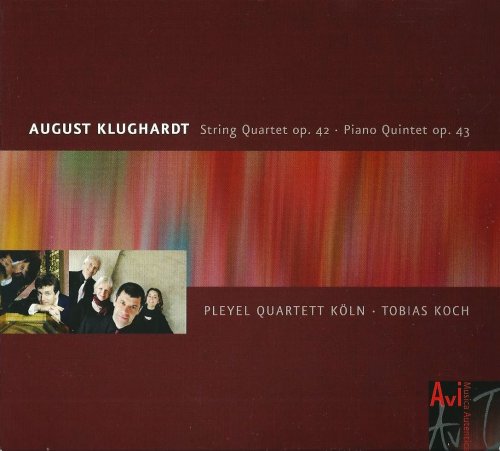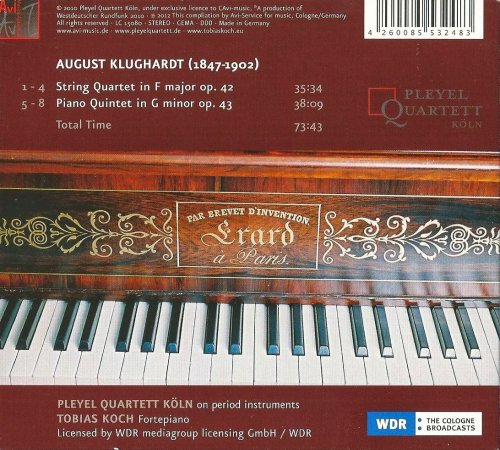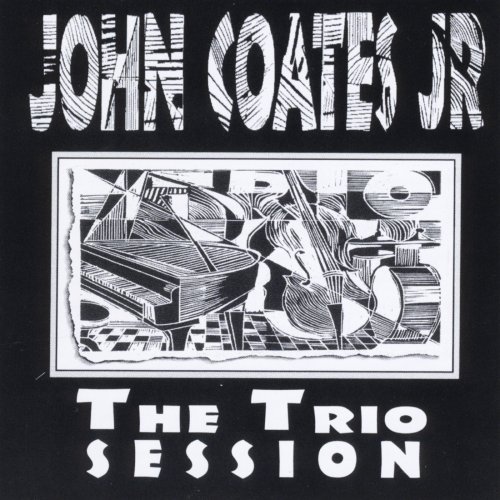Pleyel Quartett Köln - August Klughardt: String Quartet, Piano Quintet (2012)

Artist: Pleyel Quartett Köln
Title: August Klughardt: String Quartet, Piano Quintet
Year Of Release: 2012
Label: Cavi Music
Genre: Classical
Quality: FLAC (image+.cue,log,scans)
Total Time: 73:43
Total Size: 344 Mb
WebSite: Album Preview
Tracklist: Title: August Klughardt: String Quartet, Piano Quintet
Year Of Release: 2012
Label: Cavi Music
Genre: Classical
Quality: FLAC (image+.cue,log,scans)
Total Time: 73:43
Total Size: 344 Mb
WebSite: Album Preview
August Klughardt (1847-1902)
01. Klughardt - String Quartet in F major - I. Allegro [0:12:42.71]
02. Klughardt - String Quartet in F major - II. Adagio [0:10:21.73]
03. Klughardt - String Quartet in F major - III. Scherzo: Allegro molto. Moderato [0:04:56.66]
04. Klughardt - String Quartet in F major - IV. Allegro non troppo [0:07:39.36]
05. Klughardt - Piano Quintet in G minor - I. Lento. Allegro con fuoco [0:15:41.35]
06. Klughardt - Piano Quintet in G minor - II. Adagio [0:06:51.06]
07. Klughardt - Piano Quintet in G minor - III. Moderato, molto espressivo [0:06:01.48]
08. Klughardt - Piano Quintet in G minor - IV. Allegro non troppo [0:09:34.37]
Performers:
Pleyel Quartett Köln
Tobias Koch – fortepiano
In 34:6 I favorably reviewed a recording of Klughardt’s Piano Quintet on an MDG release featuring the Leipzig Quartet and Olga Gollej. I was absolutely enthralled with the first movement of that work, and enjoyed the remaining three even though they are not quite up to the same standard. The work was paired with a performance of the composer’s pleasant but decidedly lightweight String Quintet, with cellist Julian Steckel playing the fifth part. This release brings us another performance of the piano quintet, here paired instead with what appears to be the premiere recording of Klughardt’s String Quartet in F Major. A uniting thread between the two works is violinist Joseph Joachim, who led the highly successful premieres of both in 1883 and 1884, and became the dedicatee of the second due to the composer’s gratitude for his promotion of the first.
I will refer readers to my previous review for details about Klughardt’s life and compositional style, and a discussion of the piano quintet. (One correction to that previous essay: On the basis of the MDG booklet notes I referred to the composer’s “Leonore” Symphony as his No. 1; in fact, it is his No. 2, and also has just received its premiere recording.) Whereas with the two quintets I cited Schumann, Brahms, and Liszt as major influences, here in the quartet the dominant guiding spirit is that of Mendelssohn, with some distant kinship to Dvo?ák as well. The similarities should not be pressed too closely—Klughardt tends to spin out far longer-limbed melodies and is far more free-form in handling his material—but the former’s gracefulness and latter’s winsomeness are definitely present. The opening Allegro is quite complex; instead of following standard sonata form, Klughardt ingeniously overlaps and passes back and forth between several themes of equal importance in an almost rhapsodic fashion. The ensuing Andante opens with an almost hymn-like theme, and then pursues its development through a series of variations. The Scherzo brings to mind a peasant dance, and the concluding Allegro non troppo has something of the bustle of the finale to Mendelssohn’s Octet, if not its unbridled exuberance.
The Pleyel Quartet (not to be confused with the Pleyel Trio), which has made two previous discs for CPO of quartets by its namesake, performs on period instruments. Of course, when that is applied to repertoire of the later 19th century, the difference with modern instruments is considerably less than for works from the 18th century, though the distinctive sound of gut rather than steel strings is quite discernible. Tobias Koch is a fortepianist who has made several recordings for Genuin of music by Beethoven, Mendelssohn, Schumann, and Bergmüller; while the booklet notes do not say so, I infer from the photo on the back of the digipak that he plays an Erard instrument. In comparing them to Gollej and the Leipzig Quartet, I find their respective interpretations to be of equal worth. Both are quite attractive to me; though I enjoy the tang of the instruments played by Koch and the Pleyel group, I can see how someone would prefer the more familiar sound of Gollej and the Leipzig ensemble instead. Where this disc does have the edge is in its companion work; the quartet is simply a much finer piece of music than is the string quintet. If you are to have only one of the two releases, give preference to this one; heartily recommended. -- James A. Altena
I will refer readers to my previous review for details about Klughardt’s life and compositional style, and a discussion of the piano quintet. (One correction to that previous essay: On the basis of the MDG booklet notes I referred to the composer’s “Leonore” Symphony as his No. 1; in fact, it is his No. 2, and also has just received its premiere recording.) Whereas with the two quintets I cited Schumann, Brahms, and Liszt as major influences, here in the quartet the dominant guiding spirit is that of Mendelssohn, with some distant kinship to Dvo?ák as well. The similarities should not be pressed too closely—Klughardt tends to spin out far longer-limbed melodies and is far more free-form in handling his material—but the former’s gracefulness and latter’s winsomeness are definitely present. The opening Allegro is quite complex; instead of following standard sonata form, Klughardt ingeniously overlaps and passes back and forth between several themes of equal importance in an almost rhapsodic fashion. The ensuing Andante opens with an almost hymn-like theme, and then pursues its development through a series of variations. The Scherzo brings to mind a peasant dance, and the concluding Allegro non troppo has something of the bustle of the finale to Mendelssohn’s Octet, if not its unbridled exuberance.
The Pleyel Quartet (not to be confused with the Pleyel Trio), which has made two previous discs for CPO of quartets by its namesake, performs on period instruments. Of course, when that is applied to repertoire of the later 19th century, the difference with modern instruments is considerably less than for works from the 18th century, though the distinctive sound of gut rather than steel strings is quite discernible. Tobias Koch is a fortepianist who has made several recordings for Genuin of music by Beethoven, Mendelssohn, Schumann, and Bergmüller; while the booklet notes do not say so, I infer from the photo on the back of the digipak that he plays an Erard instrument. In comparing them to Gollej and the Leipzig Quartet, I find their respective interpretations to be of equal worth. Both are quite attractive to me; though I enjoy the tang of the instruments played by Koch and the Pleyel group, I can see how someone would prefer the more familiar sound of Gollej and the Leipzig ensemble instead. Where this disc does have the edge is in its companion work; the quartet is simply a much finer piece of music than is the string quintet. If you are to have only one of the two releases, give preference to this one; heartily recommended. -- James A. Altena

DOWNLOAD FROM ISRA.CLOUD
Pleyel Quartett Köln August Klughardt String Quartet Piano Quintet 12 0807.rar - 344.3 MB
Pleyel Quartett Köln August Klughardt String Quartet Piano Quintet 12 0807.rar - 344.3 MB



![Chewing, Dave Harrington, Ryan Hahn, Spencer Zahn - Quintet (Live in Los Angeles) (2025) [Hi-Res] Chewing, Dave Harrington, Ryan Hahn, Spencer Zahn - Quintet (Live in Los Angeles) (2025) [Hi-Res]](https://img.israbox.com/img/2025-12/12/owakjkfg0whflv2rzyocno89p.jpg)




